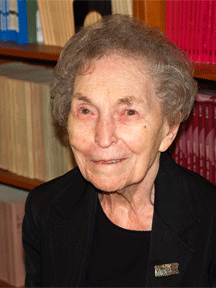By Claire McDonald
Described by the Financial Times as “one of those few economists who changed our understanding of the world,” Anna Schwartz worked for seven decades on innovative economic policy research.
Born in 1915 in the Bronx to Jewish parents who had immigrated to the United States from Eastern Europe, Schwartz attended Barnard College, graduating at age eighteen. She then worked at Columbia University’s Social Science Research Council for five years, leaving in 1941 to begin working for the National Bureau of Economic Research in New York. She would remain there for more than seventy years, during which time she earned a Ph.D. in economics from Columbia University.
Schwartz became known as a staunch proponent of monetarism, a school of economic thought sustaining that variations in the economy, such as changing rates of inflation, depend on the size of the money supply. Schwartz worked with Nobel laureate Milton Friedman to publish a number of enduring works on American economic policy, including A Monetary History of the United States, 1867-1900, which explains the root of the Great Depression as the Fed’s failure to adequately manage the money supply.
Schwartz and Friedman collaborated on so much research, in fact, that he suggested she was as deserving of the Nobel Prize as he. Friedman said at one point, “Anna did all of the work, and I got most of the recognition.”
In 1981, Schwartz served as the executive director of the U.S. Gold Commission, a seventeen-member group responsible for advising the government on the future use of gold. The panel ultimately suggested that the government mint gold coins, having little inclination to return to using a gold standard.
Schwartz continued offering economic commentary well into her nineties. In 2009, for example, she wrote an op-ed piece for the New York Times criticizing the Federal Reserve for its monetary policy following the 2008 recession. Of Federal Reserve Chairman Ben Bernanke, she wrote, “[Bernanke] has committed serious sins of commission and omission — and for those many sins, he does not deserve reappointment.” Having lived through the Depression herself, Schwartz remained firm in her belief that careful management of monetary policy was of paramount importance to economic stability.
To address the recent economic crisis, Schwartz focused on basic economic theory. In a 2009 interview with Forbes magazine, she stated, “The market works better when wrong decisions are punished and good decisions make you rich.” Schwartz further suggested that the economy would improve only when the government began acting consistently, sticking to a plan of action rather than continually changing its approach.
The same Forbes magazine interview from 2009 noted that Schwartz, then ninety-three, continued going to work in her office at the National Bureau of Economic Research nearly every day. Pointing out that Schwartz was working on an innovative study of government intervention in foreign exchange rates, the article concluded that in her nineties “she remains a trendsetter.” Even after suffering a stroke and broken hip, Schwartz remained dedicated to her work in economics.
Schwartz died in June of this year at age ninety-six. Her legacy in economic policy and the lessons she taught about past economic failures, however, will remain relevant for years to come.
Though not a Phi Beta Kappa member, Schwartz was for many years a devoted contributor of book reviews in economics to The Key Reporter and had a large following among our membership. Her son-in-law astronomer Jay Pasachoff is a resident member of the Phi Beta Kappa chapter at Williams College and also a long-time book critic for The Key Reporter. Others of her children and grandchildren are also Phi Beta Kappa members.
The Society is deeply grateful to Anna Schwartz and her family for their enduring support for our publication and for their commitment to the highest ideals of Phi Beta Kappa.
Claire McDonald is a senior at Davidson College majoring in history. Davidson College is home to the Gamma of North Carolina chapter of Phi Beta Kappa.




